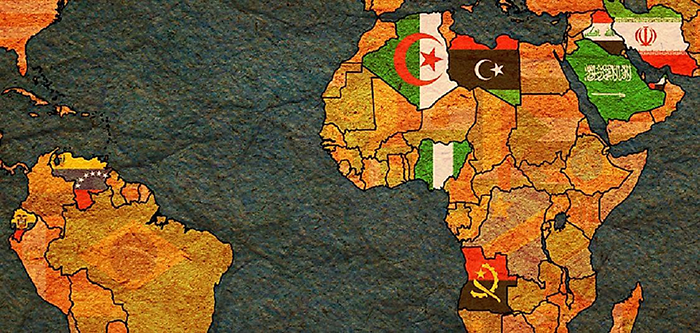
At its monthly meeting on Wednesday, the group of oil producers known as OPEC Plus refuses to take action to cool the market as the price of a barrel of oil soared.
The group, which includes Russia, said existing fundamentals and the prognosis for the future pointed “to a well-balanced market” in a statement that had surreal aspects considering the recent price spikes.
It attributed “volatility” to “geopolitical developments,” i.e., Russia’s invasion of Ukraine.
Some analysts were underwhelmed. In a letter to clients, Helima Croft, an analyst at RBC Capital Markets, wrote, “Such an argument will progressively test belief.”
The fact that Russia’s deputy prime minister, Alexander Novak, is a co-chair of OPEC Plus was left out of the statement.
The cartel said it would stick to a strategy agreed to in July, rubber-stamping a small 400,000-barrel-per-day increase in April production. Analysts generally believe that a raise of this magnitude would be insufficient to bring prices down. Furthermore, many OPEC Plus countries have produced significantly less oil than the group’s goals.
Prices spiked again after the teleconference meeting. Brent crude oil nearly hit $114 per barrel, its highest level since 2014. The price of West Texas Intermediate reached a 10-year high of $112.50 a barrel.
It’s anyone’s guess what OPEC Plus members will actually provide to the market in the coming weeks.
Trade Commodities, including Oil and Gas, Forex, Cryptocurrencies, and Binary options in Saudi Arabia on the best conditions with trusted brokers
Russia generates almost one out of every ten barrels produced worldwide. However, analysts believe that despite discounts of up to 20%, Russian crude is failing to find consumers as purchasers and shippers seek oil abroad, fearful of being caught up in Western sanctions against Moscow. According to Energy Aspects, a research group, almost 70% of Russian traded petroleum is affected.
In a statement to clients, the firm stated, “Most European giants are not touching Russian oil, and only a few European refiners and trading firms are still in the market.” For dealing with Russian energy, freight charges and insurance premiums have risen as well.
OPEC Plus was producing far less than its targets even before Russia’s invasion of Ukraine. In January, OPEC Plus fell short by 900,000 barrels per day, or nearly 1% of total production, according to the International Energy Agency, which works to shape global energy policy.
Saudi Arabia, as the de facto leader of the Organization of Petroleum Exporting Countries, is likely to be concerned about the unpredictably rising oil prices. Apparently, things haven’t progressed to the point where Saudi Arabia and its allies, such as the United Arab Emirates, might act unilaterally and sell more oil than they promised to.
Furthermore, analysts speculate that the Saudis may be prepared to let geopolitics bear the brunt of the oil price rise in order to keep the cash flowing.
Discussions of the specifics of output increases may be difficult at best with Mr. Novak sitting as a co-chair of OPEC Plus. Following the Wednesday meeting, OPEC Plus did not conduct a press conference, possibly to avoid awkward questions aimed at Mr. Novak.
Saudi Arabia and Russia have had a tense relationship for a long time, but the fall of oil prices in 2014, owing in part to significant increases in output in the United States, a rival to both, drove the two petroleum powers to work together to limit output.
Although Moscow is not a member of OPEC, it joined an alliance with the Saudi-led cartel in 2016 called OPEC Plus. The two had a brief spat during the start of the pandemic in 2020, resulting in a price war, but quickly patched things up. To the chagrin of some other members, Riyadh and Moscow are in charge of OPEC Plus to a large extent.
Despite rising oil prices, the US oil industry is hesitant to dramatically boost production.
Several businesses’ executives, notably Pioneer Natural Resources, Devon Energy, and Continental Resources, have recently stated that they are committed to reducing production in order to prevent oversupplying the market and driving prices down to unprofitable levels. After oil prices plummeted in the early days of the coronavirus pandemic, several businesses embraced this tactic.
Earn passive income trading Commodities, including Oil and Gas, Crypto, Forex, CFDs, and Binary options in Nigeria with trusted brokers
On Friday, Occidental CEO Vicki Hollub told analysts that there was “no need and no intention” to engage in production increases.
And it appears that mechanisms for preventing price rises are in scarce supply. The International Energy Agency’s announcement on Tuesday of a 60-million-barrel emergency release of oil held in reserves provoked a price spike rather than the expected market cooling.
In a note to clients on Tuesday, Goldman Sachs analysts said, “We do not consider this as sufficient relief.” “Demand destruction,” or reducing oil consumption as a result of high prices, they stated, “is now likely the sole sufficient rebalancing mechanism.”
To put it another way, more price hikes are required to bring the world’s need for oil back into line with supply.
Subscribe for our newsletter
Get Forex brokers reviews, market insights, expert analytics and education material right into your inbox for free!